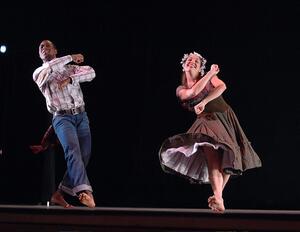Premiere of Sophie Maslow's "The Village I Knew"
Photo by Paulgordonemerson
The American Dance Festival premiered Sophie Maslow's The Village I Knew on August 18, 1950, in New London, Connecticut. The suite of dances, which was based on Sholom Aleichem stories and depicted life in a pre-war Russian Jewish shtetl, was called "charming" and "warm and tender and funny and distinctly a credit to Miss Maslow" in a New York Times review. After the success of this piece, which was later staged in many places including London and Israel, Maslow was often considered primarily a Jewish dancer and choreographer, but her dance roots were actually much broader.
Born in 1911 and raised in New York, Maslow studied at the Neighborhood Playhouse, where Martha Graham's early company was formed. From 1931 to 1940, Maslow was a member of the Martha Graham Company, appearing in productions of Primitive Mysteries (1931), American Document (1938), and Letter to the World (1940), among others. The new form of modern dance pioneered by Graham became an important part of Maslow's own style.
During the same time, many dancers in New York were involved with leftist politics; Maslow was no exception. She taught dance classes for the International Ladies Garment Workers Union, and participated, alongside lifelong friend Anna Sokolow, in Workers Dance League concerts. For League concerts, she choreographed or danced such pieces as May Day March (1936) and Women of Spain (1938).
Beginning in 1941, Maslow produced dances that focused on the American experience. The first piece to define this new style was Dust Bowl Ballads, based on the music of Woody Guthrie. Guthrie's songs were also incorporated—along with lines from Carl Sandburg—into Folksay (1942). An early dance critic called Folksay "radiantly outflung, joyous and free ... simple and heart-warming and endearing." Like Ballads and Folksay, many of Maslow's dances from this period incorporate folk music or grow out of folk dances. Also in the 1940s, Maslow formed the Dudley-Maslow-Bales Trio, which emerged from the leftist New Dance Group.
In the 1950s, following the success of Village, Maslow produced many more works with Jewish themes. These included Celebration, based on Israeli songs (1954), Anniversary, commemorating the Warsaw Ghetto uprising (1956), and The Dybbuk (1965). Jewish themes, however, were never her exclusive focus; in 1978, for example, she choreographed Visions of Black Elk, based on the massacre of American Indians at Wounded Knee, South Dakota. Most of these dances were originally staged by Maslow's own Sophie Maslow Dance Company, though they have since been widely performed by other groups. Maslow continued an active life, staging her dances and traveling widely, well into her eighties. In March, 2000, she was awarded a Balasaraswati/Joy Ann Dewy Beineke Chair for Distinguished Teaching by the American Dance Festival, an organization she had helped to found. Maslow died in June 2006 at the age of 95.
Sources:New York Times, August 19, 1950, February 10, 1978, March 6, 2000; Jewish Women in America: An Historical Encyclopedia, pp. 895-898; Garafola, Lynn, ed., Of, By, and For the People: Dancing on the Left in the 1930's in Studies of Dance History, Vol. 5, No. 1 (1994); Ellen Graff, Stepping Left: Dance and Politics in New York City, 1928–1942 (Durham, NC, 1997).




My mother, Sophie Maslow, died of natural causes in New York City on June 25, 2006. I am her only child. Her late husband, the painter and teacher Max Blatt, died in July, 1990. Ms. Maslow's first cousin is the late artist Leonard Baskin. In 2007, the CityDance Ensemble of Washington, DC reconstructed Ms. Maslow's DUST BOWL BALLADS, and in 2008, the same company reconstructed FOLKSAY, which received the Washington DC Metro Dance Award for best group dance. The Board of The Sophie Maslow Dance Company is looking forward to celebrating Sophie Maslow's 100th birthday in 2011 with performances and events honoring her legacy.
In reply to <p>My mother, Sophie Maslow, by Abby Maslow Blatt
Love to connect I was at New Dance Group Studio r
Taking class with your mom. She passed on my birthday
May her life be for a blessing ❤️